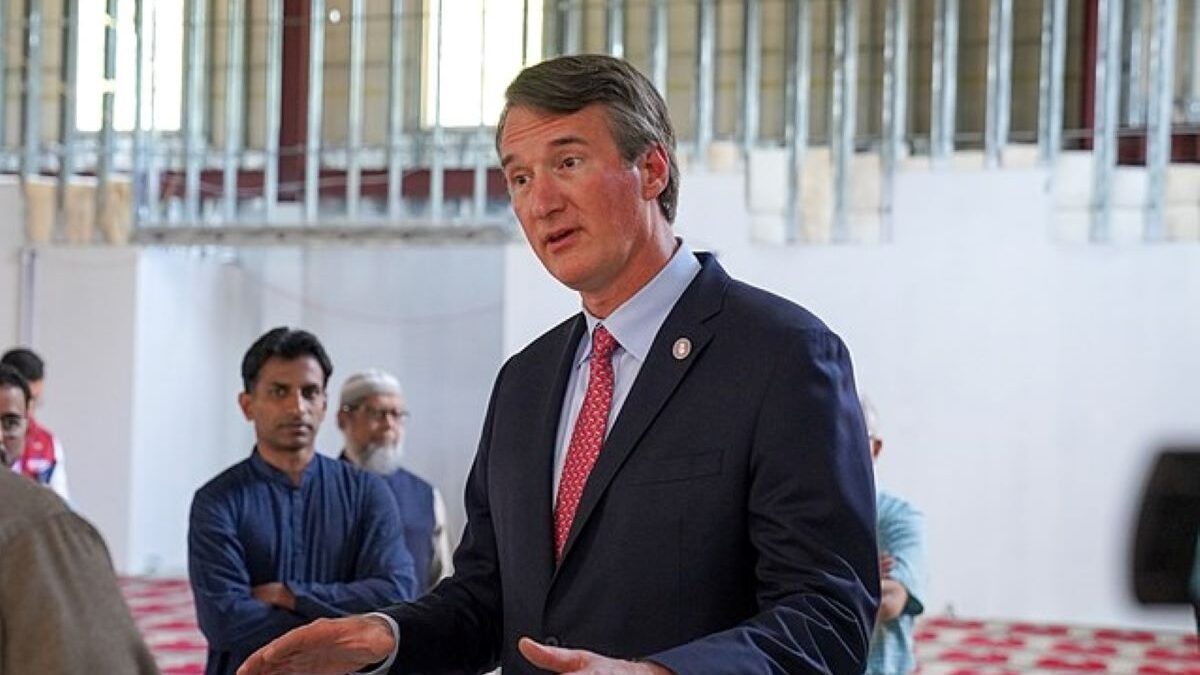Virginia Gov. Glenn Youngkin and Attorney General Jason Miyares say they don’t have the jurisdiction to enforce state law against leftist protesters who have been demonstrating outside the homes of several U.S. Supreme Court justices in the Commonwealth.
Following the leak of a draft majority opinion from the high court that would overturn Roe v. Wade, pro-abortion protesters have been showing up at the homes of Republican-appointed Supreme Court justices in recent weeks in an attempt to intimidate members of the court into upholding the 1973 decision that legalized abortion nationwide.
On Wednesday, several demonstrators who were dressed up as characters from “The Handmaid’s Tale” marched outside the Virginia home of Justice Amy Coney Barrett, with one participant saying that “the fact that [Barrett is] an adoptive mother is influencing her inability to see what it’s like to carry a pregnancy to term,” despite the justice having birthed five biological children.
Pro-abortion leftists also surrounded the Virginia residence of Justice Samuel Alito on Monday, as well as the Maryland homes of Justice Brett Kavanaugh and Chief Justice John Roberts over the past weekend.
In response to the intimidation tactics, Youngkin, along with Maryland Gov. Larry Hogan, sent a letter to U.S. Attorney General Merrick Garland, in which the Republican governors called upon the Department of Justice to prosecute demonstrators for violating federal law.
“While we are willing to assist in the event the need for increased security measures becomes imminent, federal law enforcement entities must take the lead and provide sustained resources to protect the Justices and ensure these residential areas are secure in the weeks and months ahead,” the letter reads. “Today, we together ask that the Department of Justice through the respective United States Attorneys’ offices provide appropriate resources to safeguard the Justices and enforce the law as it is written.”
In the letter, Youngkin and Hogan cite 18 U.S. Code § 1507, which explicitly states that “[w]hoever, with the intent of interfering with, obstructing, or impeding the administration of justice, or with the intent of influencing any judge, juror, witness, or court officer, in the discharge of his duty, pickets or parades in or near a building housing a court of the United States, or in or near a building or residence occupied or used by such judge, juror, witness, or court officer, or with such intent uses any sound-truck or similar device or resorts to any other demonstration in or near any such building or residence, shall be fined under this title or imprisoned not more than one year, or both.”
In addition, Youngkin has requested that the Fairfax County Board of Supervisors order the county’s police department to “establish an expanded security perimeter” around the justices’ homes.
While such rhetoric may seem meaningful, Youngkin, along with Miyares, says he cannot enforce Virginia state law that would hold demonstrators accountable for their illegal actions. As detailed in § 18.2-419 of the Virginia Code, “Any person who shall engage in picketing before or about the residence or dwelling place of any individual, or who shall assemble with another person or persons in a manner which disrupts or threatens to disrupt any individual’s right to tranquility in his home, shall be guilty of a Class 3 misdemeanor,” which constitutes as “a fine of not more than $500.”
When asked if Miyares intends to pursue charges against violators under the statute, a representative for the attorney general told The Federalist that “[u]nder Virginia law, local Commonwealth’s Attorneys are responsible for prosecuting violations of [the] statute.”
“Attorney General Miyares urges every Commonwealth’s Attorney to put their personal politics aside and enforce the law,” said spokeswoman Victoria LaCivita.
Throughout the 2021 Virginia election cycle and beyond, Miyares has routinely cast himself as a “law and order” figure willing to be tough on crime. In a December op-ed for the Washington Examiner, for instance, Miyares pledged that if Virginians’ local prosecutor wouldn’t enforce the law, he would.
“When an elected commonwealth’s attorney publicly states that he will not prosecute a crime, citizens should have a backup plan to ensure that victims get their day in court,” he wrote.
When pressed on enforcement of § 18.2-419, Youngkin told The Federalist that the statute is “barely more punitive than a parking ticket.”
“The federal statute is absolutely clear that parading and picketing in order to influence a justice is punishable with up to a year in prison,” he said in reference to 18 U.S. Code § 1507. “This is a time where local law enforcement, state law enforcement, and federal law enforcement need to collaborate and come together in order to make sure that we are upholding the law and keeping people safe.”
UPDATE: A Miyares spokeswoman responded further to The Federalist after this article’s publication with more details about the Virginia attorney general’s statutory obligations: “Local Commonwealth’s Attorneys are constitutional officers created by Article VI, Section 4 of the Virginia Constitution. In Virginia, there are 120 elected CAs across the Commonwealth. Local CAs are given numerous statutory duties, but specifically tasked under Va. Code Section 16.1-232 with the prosecution of felony charges within their jurisdiction and the discretion to prosecute misdemeanor charges before such court.”
This article has been corrected and updated since publication.









